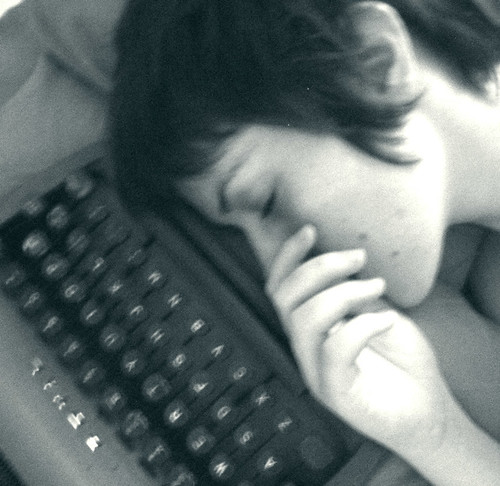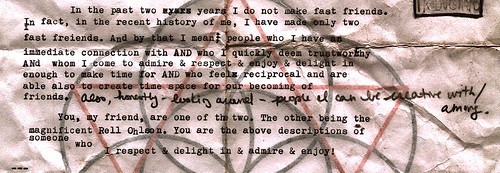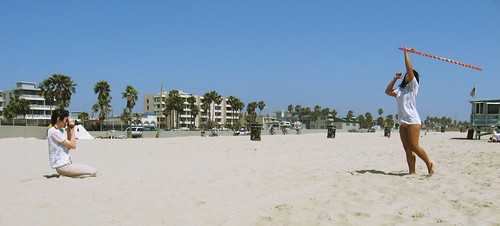Severe judgmental culturally elite complex writing literary industry commercial prospects. This is fucked up serious damage.
TIME STAMP:
Tuesday, June 20, 2006
TITLE:
difficult gems
BODY:
key phrases to look out for:
- severe judgment
- This is fucked up
- culturally elite
- neatly equated
- complex writing
- serious damage
- commercial prospects
- literary industry
---
Citing Ulysses as the ultimate scare text, he claims, that its frequent placement on top-ten lists of the best books of the twentieth century "sends this message to the common reader: Literature is horribly hard to read. And this message to the aspiring writer: Extreme difficulty is the way to earn respect. This is fucked up. It's particularly fucked up when the printed word is fighting other media for its very life."
Even while popular writing has quietly glided into the realm of the culturally elite, doling out its severe judgment of fiction that has not sold well, and we have entered a time when book sales and artistic merit can be neatly equated without much of a fuss, Franzen has argued that complex writing, as practiced by writers such as James Joyce and Samuel Beckett and their descendants, is being forced upon readers by powerful cultural institutions (this is me scanning the horizon for even the slightest evidence of this) and that this less approachable literature, or at least its esteemed reputation, is doing serious damage to the commercial prospects of the literary
industry.
-From a Harper's Article (you know about this Timothy)
---
Do I agree?
There's plenty of accessible literature out there being sold and even SOLD-OUT. What's wrong with studying some difficult gems? What's wrong with pushing the limits? So maybe some people get left behind but there's always BEST SELLERS. There's still a middle between Donald Barthelme and The DaVinci Code.
And then there's movie adaptations.
Literature. Hmm...
---
COMMENTS:
12:47 PM - 7 Comments - 4 Kudos - Add Comment - Edit - Remove
The Timothy Corporation
I do, I do.
Posted by The Timothy Corporation on Tuesday, June 20, 2006 at 12:58 PM
[Remove] [Reply to this]
anna
so maybe some people get left behind, but there's always left behind. now that's great literature.
Posted by anna on Tuesday, June 20, 2006 at 1:03 PM
[Remove] [Reply to this]
DeenaOdelle
there was a movie adaptation of that in 2000.
the IMDb tagline for the movie = "the future is clear"
bullshit!
Posted by DeenaOdelle on Tuesday, June 20, 2006 at 1:07 PM
[Remove] [Reply to this]
Exeter
As a card-carrying member of the countrys cultural elite please excuse me while I get out my soapbox. I think its grossly short sighted to say that the force feeding of difficult literature to popular society is such a bad thing. Furthermore I think that as painful as it may (or may not) be, its necessary. Not everyone enjoyed taking basic science and math classes in school, but without some sort of basic bank of societal knowledge about these things communication would be impossible. The same is true of literature.
This concludes the intellectual diarrhea.
I love D.O.H.
Posted by Exeter on Tuesday, June 20, 2006 at 2:00 PM
[Remove] [Reply to this]
Thoracles Odinrocker
The problem is we no longer have to courage to say something sucks, or I don't understand it (and just because you personally don't understand it, doesn't make it stupid), and we have no idea what constitutes "good literature." I'm not saying that I do, but I do know that there is a difference between "good literature" and "writing that is good only because it makes you turn the page." The latter is a psychological device that can be expertly crafted, but will not push the bounds of literature to new levels of anything except summer-time book sales and terrible movie adaptations. Our children will not read The DiVinci Code; they will read Tim O'Brien's work.
Posted by Thoracles Odinrocker on Tuesday, June 20, 2006 at 2:57 PM
[Remove] [Reply to this]
The Timothy Corporation
Accessibility and experimentation are not mutually exclusive. There are plenty of writers able to push the boundaries of language and narrative form without sacrificing one iota of their readership. To me, that's the definition of literary genius.
(Name-dropping time! Writers like Alice Munro, George Saunders, and Robert Coover are perfect examples of authors who maintain that balance.)
ps..My mom LOVES the Left Behind series.
Posted by The Timothy Corporation on Tuesday, June 20, 2006 at 6:25 PM
[Remove] [Reply to this]
Christopher el Mexicano Barbudo Rojo
An observation, perhaps even a thought: There is more to the quote than the idea that "difficult" literature is being force fed, so I think. The problem, and I do believe it is a problem, and grevious one, is that there has been established a great gulf between what academics might call literature and what people are reading. No doubt there is a lot of literature that is accesable, but there is, it must be stated, much that is not. Why? Joyce, and he does deserve to be cited here, and the other modernists, especially later in their careers, filled there works with as much "stuff"--to use the technical term--as was possible. This makes it difficult for your average, even for your exceptional, reader. Anyone can pick up pretty much any 19th century novelist of poet and read and enjoy with little effort or education; the same cannot be said regarding many of the "greats" of the 20th century. The modernists, in an attempt to make literature more rich, made it also more obscure, this necessarily limited their audience. We have seen over the last many decades an increasing academization of literature. It is becoming a specialist field. This is not yet so clear in prose as in poetry, which is will serve as a more stark example. Poetry is no longer written for people, but is written for poets and critics. Eliot himself said that only a poet can criticize a poem. This is a new and exclusionary idea. Poetry is no longer for the people. Prose is going the same way. "But what?" you say, "there is so much literature being printed." And to be sure, there is. But compare this to the prose of a century ago. In the 19th century, newspapers were filled with serialized authors such as Dumas, Hugo, Tolstoy, and Dosteoevsky--names which are not venerable merely because they are old--imagine such a thing today. Imagine even serialized novels. Difficult, I know. Why? That is a big question which I should not attempt to answer in a blog comment. But it must be acknowledged that literature occupies a very different, and much more narrow, space in the lives of people today. At least one factor affecting this, is, I strongly believe, that people do think "real literature"--a term that you will hear them say--is too hard. Perhaps the idea of real literature needs be redefined (or, for that matter, defined at all). You see the same thing in philosophy and music. Few today will read Aristotle for leisure or listen to Palestrina for contemplation. No, there is an aversion to the "difficult stuff." I do believe that "cultural institutions"--we call those universities where I come from--force an idea about literature on people, and I believe this idea is very incorrect. We are losing the middle ground, so it seems, between literature as something to be enjoyed, and literature as something to be studied. Before guys like Joyce & co., it was not necessary to "study" literature. Anyone can enjoy Milton without getting all of his references; without getting all of his references--and who does?--Pound's Cantos are unintelligable. This is a big difference, and I would argue, a big problem. Ok, that's the observation and the thought, I shall close with a recommendation: Read Dana Gioia's book, Can Poetry Matter, and perhaps also some works on criticism and literature by G.K. Chesterton and C.S. Lewis. Pushing the envelope may be a good, but not at the expense of the letter.
Greetings!
Hello and welcome to BashaMO, The Blog.
This blog is run by the scientifically proven theory that sharing is caring. Therefore I must care about you, whomever you may be..
This blog is run by the scientifically proven theory that sharing is caring. Therefore I must care about you, whomever you may be..
Sunday, August 5, 2007
Subscribe to:
Post Comments (Atom)








1 comment:
"Pushing the envelope may be a good, but not at the expense of the letter."
holy shit, i completely agree with CHRISTOPHER!
Post a Comment